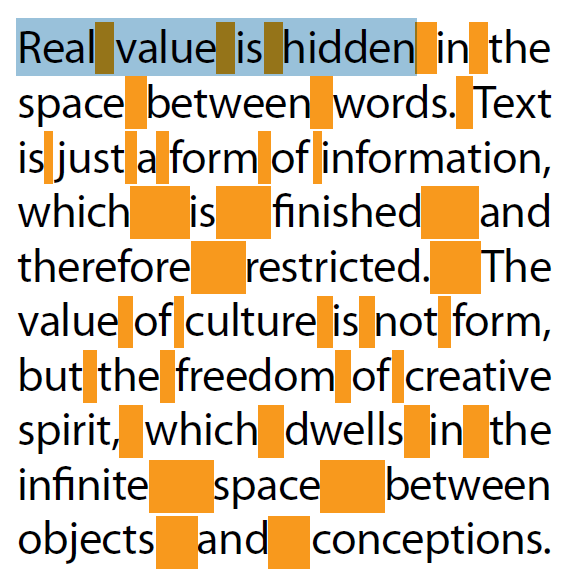Hack:
Riga DO™ Social Doing Platform - creating new Opportunity spaces
Implementing a multi-stakeholder scaffold/framework that grows participation, elicits and leverages human and social capital, aggregates microefforts and delivers engagement and crowdsourcing.
By and large inertia gets the best of organizations and communities, as well as in our personal lives. It is simply plain hard to DO a lot, and often the micro-effort to change – which may start simply with a conversation or small steps – leads nowhere. Inertia accumulates, and then, we feel that a lot needs to be accomplished very quickly. As a result, we run into huge change management issues or are simply paralyzed by the magnitude of what we think needs to change.

People in more or less any organisation, with various degrees, have limited capacity to understand one another in a deeper sense (e.g. due to lack time, different focus, different perspectives, inertia, etc.). When this happens, the available disposition and energy to change is initially minimal. As a consequence groups often fall into low-engagement modes, into recurrent patterns of talk that produce no alignment, no action or outright disruptive behaviour.
The problem is how to convert the small disposition to explore new opportunities and change attitudes into DOING. This “hack” offers a tweak any organisation, business or city can adopt.
www.rigado.me is a social platform for getting together, in person and the web, to sum micro-efforts, build trust, and empower groups to DO more (less talking in circles, waste of time, re-work and so on). The main components are voluntary participation, free-structured time, projective methods for constructive-speak and short bursts of time, repeated regularly to achieve results. The core knowledge in the design is an understanding of patterns of talking and learning. Groups learn within a month to monitor their own progress on-the-job using simple but well thought components.
- A face to face streamlined process that allows common opportunity pictures to form in an accelerated time frame.
- A social dynamic to stimulate participation (making use of a social graph to instil content in social places throughout the organization/town.
- A web/mobile and social game platform to amplify effects and manage collaborative projects.
- And a market making mechanism for commons (new token currency based on impact on natural/common resources).
Business and other types of organizations are built on essentially static sense-making scaffolds. These enable to recognize assets, skills, and people in relation to a purpose that changes less and less with success and accumulated experience. Everything, from what one should study, to what products should the business develop, or which services a community should offer, are the result of the scaffold in place.
When we face low profits or low growth, high unemployment, loss of health, etc., and these are chronic (recurrent over longer periods of time), then it is necessary to tweak scaffolds (sense-making processes). The challenge for most organisations is that they are problem-solving oriented. They assume that the scaffolds work or examine only isolated aspects at a time.
The rig-a-DO hack offers a light structure scaffold that helps the interaction of a group to take off. It is easy to remove once this kick-start function is complete. The scaffold offers a hack of bits of proven ideas and experiences to tweak the capacity of a diverse group to make progress faster (on their own terms) and become confident in their capacity and trust to DO.
We started with a prototype applied to a city and a cause (Communities around the Baltic Sea) but this is well, quite ambitious. The problem of the Baltic Sea has received a lot of attention from the Ministry of Nordic Countries over more than a decade. However, as in many other areas, it is very hard to get short term interests to line up to long term issues.
If you wanted to try this hack the process can be much simpler.
- Phase I – is to select groups where collaboration really matters. It must be important for real otherwise you will not have the voluntary participation that you require. While you do this, you will use methods from our ConversationLab to asses yourselves how constructive your conversations are.
- Phase II – is a bespoke design for flash groups to meet. The expected outcome is that weekly or bi-weekly events have a noticeable impact within three months of use.
- Phase III – your organization will now have a core team that can scale up the use of the method. The web social platform we use offers an excellent learning-by-doing tool that is both secure and open for groups to shape (instead of a finished out of the box tool), which is essential to build ownership of such process.
- Norden (The Nordic Council of Ministers) is providing an opportunity here around saving the Baltic Sea as the larger reference framework.
- ConversationLab (Sweden) is providing unique technologies and methods for more effective/constructive dialogue that will create new jobs, solutions, etc.
- Siriti (South Africa and Latvia) is providing large scale social and business change methods.
- Anahitapolis is providing a superior web architecture to support local groups.




You need to register in order to submit a comment.